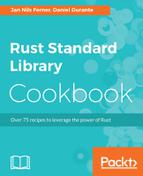This recipe begins like the last one, so let's skip straight into the definition of our Service[14 to 22]:
|req: Request| {
match (req.method(), req.path()) {
(&Method::Get, "/") => handle_root(),
(&Method::Post, "/echo") => handle_echo(req),
_ => handle_not_found(),
}
}
We are now using the Request parameter that the last recipe simply ignored.
Because Rust allows us to pattern match on tuples, we can directly differentiate between HTTP methods and path combinations. We then pass on the control flow of our program to dedicated route handlers, which in turn are responsible for returning the response.
The code for handle_root [29] looks nearly identical to the hello world Service from the last chapter, but instructs the caller to POST at the /post route.
Our match for said POST leads to handle_echo [37], which simply returns the request's body as the response's body [40]. You can try this for yourself by POSTing a message to http://localhost:3000/echo, as described in the Getting ready section. If everything goes right, your message will come right back at you.
Last, but not least, handle_not_found [43] is called when no routes matched. This time, we don't send a message back, but instead, return the possible most famous status code of the world: 404 Not Found [45].
